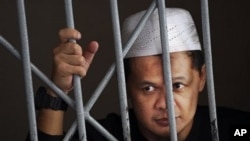In Indonesia, security and religious analysts say the planned bombing of a church and recent attacks on the police and moderate Muslim leaders, show that violent extremist groups are growing closer to non-violent Islamist organizations to draw in new militants. They say the Southeast Asian terrorist network Jemaah Islamiyah is aligning with legal fundamentalist groups that provide ideological guidance and support to justify attacks against other Indonesians.
Indonesian police say the 20 suspects recently arrested for planting explosives near a church on the outskirts of Jakarta were also involved in a number of book bombs sent to moderate Muslim leaders. They are still investigating if there is any operational link between this terrorist cell and the suicide bomber who blew himself up in a police mosque earlier this month. But Indonesia’s National Counter-Terrorism Agency says the suspects have all been involved in the terrorist network Jemaah Islamiyah or other radical groups.
Noor Huda Ismail, executive director of the International Institute for Peacebuilding, which works to reform radical inmates in prison, says while J.I. may no longer directly engage in violence, it does not condemn it either.
"I don't think they never ever denounced violence. They do not condemn. They condone. They do not condemn but they condone. For instance they say like this, 'What they did was wrong but their intention was right, but their methodology was wrong.' What does that mean? That is ambiguity. There is ambiguity here," he said.
These Islamic extremist groups, he says, continue to find new recruits through outreach and religious educations programs. Ismail says the government needs to take measures to prevent these groups from advocating violence.
In the past, J.I. focused on what its members considered an external threat against Muslims from the West, and was involved in attacks against places where foreigners gathered, such as international hotels and embassies. The group was responsible for the 2002 bombing of restaurants in Bali that killed 202 people. But Indonesian authorities have arrested, tried and convicted scores of J.I. followers, and others have been killed resisting arrest.
And Indonesian public opinion turned against the group in part because its attacks killed many Muslims.
However, in recent years, a few legal groups, such as the Islamic Defenders Front, have been involved in sometimes violent protests to keep Christians from building churches and to push the government to ban the Islamic sect known as Ahmadiyah, which many other Muslims consider to be religiously deviant.
Sidney Jones, a security analyst with the International Crisis Group, says networks like J.I. now support attacks against police and religious minorities to align themselves with what they see as a growing popular cause among Muslim fundamentalists.
"These larger organizations at the same time are saying that the reason we are not engaging in violence now is that we don't have public support," said Jones. "We need public support before we can actively engage in this kind of attack. How do we get that support? It is by choosing issues that will resonate with the local public and those issues include the anti-Ahmadiyah campaign and some of the efforts to stop churches from being built."
She says the new combination of small independent cells initiating attacks and large organizations providing ideological recruitment and support will make it more difficult for police to prevent terrorist attacks.





